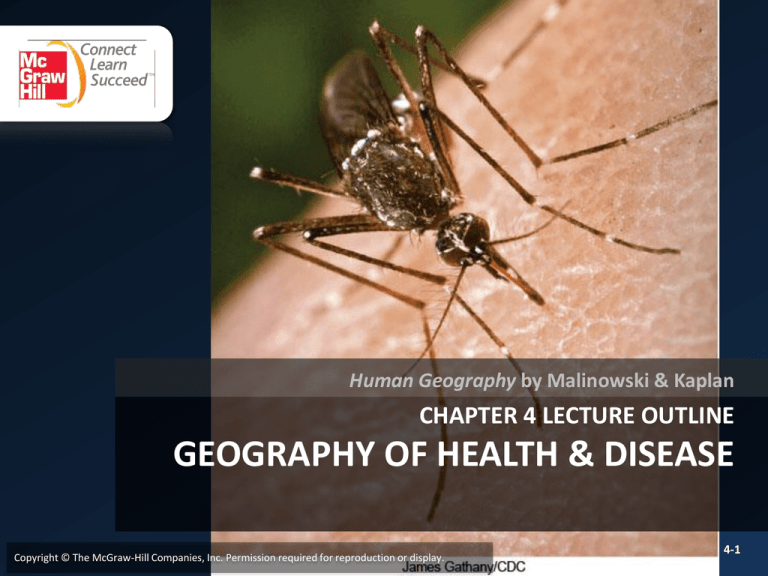
Human Geography by Malinowski & Kaplan
CHAPTER 4 LECTURE OUTLINE
GEOGRAPHY OF HEALTH & DISEASE
Copyright © The McGraw-Hill Companies, Inc. Permission required for reproduction or display.
4-1
Chapter 4 Modules
•
•
•
•
•
•
•
4A Health and Geography
4B Human Ecology of Disease
4C Disease Basics
4D HIV/AIDS
4E Common Diseases
4F Snapshot of Global Health
4G Geography of Health Care
Copyright © The McGraw-Hill Companies, Inc. Permission required for reproduction or display.
4-2
Medical Geography
• The application of geographic ideas,
information, and theories to the study of
disease, health, and health care.
• Also called Health Geography
Copyright © The McGraw-Hill Companies, Inc. Permission required for reproduction or display.
4-3
4A: Health and Geography
• Approaches:
• Human-Environment relationships
• Poor environments can negatively affect health
• Pollution and other human-made problems
• Culture
• Religious or other cultural attitudes/practices can
affect how diseases or other ailments are dealt with
• Movement
• Diffusion of diseases
Copyright © The McGraw-Hill Companies, Inc. Permission required for reproduction or display.
4-4
SARS 2002-2003
Copyright © The McGraw-Hill Companies, Inc. Permission required for reproduction or display.
Figure 4A.3
4-5
4B: Human Ecology of Disease
• Human Ecology:
• the interconnections
between human
populations and the
physical world
• Triangle of Human
Ecology:
• Population
• Behavior
• Habitat
Copyright © The McGraw-Hill Companies, Inc. Permission required for reproduction or display.
4-6
Insults and Stimuli on Health
• Chemical Insults:
• Drugs, exposure to chemicals or gases
• Physical Insults:
• Trauma from accidents, radiation, shock
• Psychosocial Insults:
• Crowding, anxiety, love, sense of belonging
• Infectious Stimuli:
• Viruses, bacteria, protozoa
Copyright © The McGraw-Hill Companies, Inc. Permission required for reproduction or display.
4-7
4C: Disease Basics 1
• Endemic:
• A disease that’s always present in a
population
• Epidemic
• A disease that occurs in larger #s than normal
• Pandemic
• A worldwide epidemic
Copyright © The McGraw-Hill Companies, Inc. Permission required for reproduction or display.
4-8
4C: Disease Basics 2
• Agent:
• The organism that causes a disease
• Bacteria, viruses, protozoa, worms, etc.
• Host:
• The life form, animal or human, that has the
disease caused by an agent
• Vector:
• The means by which the agent is transmitted
to the host
• Such as mosquitoes, flies, ticks, bats, or rodents
Copyright © The McGraw-Hill Companies, Inc. Permission required for reproduction or display.
4-9
Schistosomiasis
Copyright © The McGraw-Hill Companies, Inc. Permission required for reproduction or display.
Figure 4C.3
4-10
4D: HIV/AIDS
• Pandemic:
• Over 25 million deaths since 1981
• Different geographies around the world
• Prevention measures:
•
•
•
•
Sex education
Retroviral drugs
Free syringes in high drug-use areas
Affordable testing
Copyright © The McGraw-Hill Companies, Inc. Permission required for reproduction or display.
4-11
HIV/AIDS
Copyright © The McGraw-Hill Companies, Inc. Permission required for reproduction or display.
Figure 4D.1
4-12
HIV/AIDS IN AFRICA
Copyright © The McGraw-Hill Companies, Inc. Permission required for reproduction or display.
Figure 4D.2
4-13
4E: Common Diseases 1
• Malaria
• 40% of the world’s population is at risk
• 500,000,000 cases per year
• Caused by Plasmodium parasites spread by
mosquitoes
• Proximity to water is a key factor
Copyright © The McGraw-Hill Companies, Inc. Permission required for reproduction or display.
4-14
DISTRIBUTION OF MALARIA
Copyright © The McGraw-Hill Companies, Inc. Permission required for reproduction or display.
Figure 4E.1
4-15
4E: Common Diseases 2
• Tuberculosis (TB)
• Pulmonary disease
• 9 million new cases a year
• 1/3 of the world’s population has been
exposed
• Hard to control because it is transmitted
person-to-person
• Single sneeze can release 40,000 droplets of
infected spit
Copyright © The McGraw-Hill Companies, Inc. Permission required for reproduction or display.
4-16
DISTRIBUTION OF TB
Copyright © The McGraw-Hill Companies, Inc. Permission required for reproduction or display.
Figure 4E.2
4-17
4E: Common Diseases 3
• Yellow Fever
• Mosquito-transmitted viral disease
• Endemic in Africa & Latin America
• 200,000 cases & 30,000 deaths a year
• Diarrhea
• A leading killer worldwide
• Kills 2 million children under 5 each year
• Influenza
• Killed 100 million people during 1916-1918
• Continues to be a major health concern
Copyright © The McGraw-Hill Companies, Inc. Permission required for reproduction or display.
4-18
YELLOW FEVER
Copyright © The McGraw-Hill Companies, Inc. Permission required for reproduction or display.
Figure 4E.3
4-19
INFLUENZA in the U.S., 1918-1920
Copyright © The McGraw-Hill Companies, Inc. Permission required for reproduction or display.
Figure 4E.5
4-20
PHYSICIANS / 10,000 PEOPLE
Copyright © The McGraw-Hill Companies, Inc. Permission required for reproduction or display.
Figure 4F.1
4-21
SAFE DRINKING WATER
Copyright © The McGraw-Hill Companies, Inc. Permission required for reproduction or display.
Figure 4F.2
4-22
PROPER SANITATION
Copyright © The McGraw-Hill Companies, Inc. Permission required for reproduction or display.
Figure 4F.3
4-23
UNDERNOURISHED POPULATION
Copyright © The McGraw-Hill Companies, Inc. Permission required for reproduction or display.
Figure 4F.4
4-24
4G: Geography of Health Care
• Access to health care can be limited by:
• Functional factors
• Absence or presence of health care resources
• Geographic factors
• Proximity to resources
• Social factors
• Racism, sexism
• Financial factors
• Limited access to the poor in some areas
Copyright © The McGraw-Hill Companies, Inc. Permission required for reproduction or display.
4-25
PUBLIC HEALTH EXPENDITURES
Copyright © The McGraw-Hill Companies, Inc. Permission required for reproduction or display.
Figure 4G.1
4-26
DOCTORS PER CAPITA
Copyright © The McGraw-Hill Companies, Inc. Permission required for reproduction or display.
Figure 4G.2
4-27









